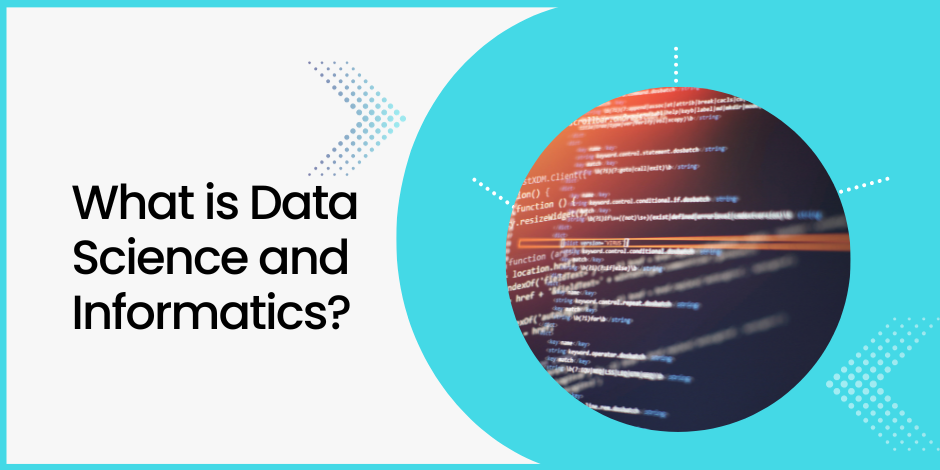What Is Data Science and Informatics?

Stay Informed With Our Weekly Newsletter
Receive crucial updates on the ever-evolving landscape of technology and innovation.
Data science and informatics are closely related fields that are crucial in the modern world.
They both deal with the collection, analysis, and interpretation of data to gain insights and solve complex problems.
Understanding the basics of data science

Data science is an interdisciplinary field that combines mathematics, statistics, computer science, and domain knowledge to extract knowledge and understanding from data.
It involves using various techniques and tools to analyze and interpret vast amounts of data.
Data science has gained significant importance in recent years due to the exponential growth of data generated by various sources such as social media, sensors, and internet usage.
This abundance of data has created a need for professionals who can make sense of it and derive valuable insights.
One of the fundamental aspects of data science is data preprocessing.
Before any analysis can take place, raw data needs to be cleaned and transformed into a suitable format.
This process involves removing outliers, handling missing values, and normalizing data to ensure consistency and accuracy.
The role of data in modern business
In today’s data-driven world, data is crucial in helping businesses make informed decisions.
By gathering and analyzing data, businesses can identify trends, patterns, and correlations, leading to valuable insights.
This, in turn, enables businesses to improve efficiency, identify new opportunities, and drive innovation.
Key concepts in data science
Several key concepts in data science form the foundation of this field.
These concepts include data mining, machine learning, predictive modeling, visualization, and statistical analysis.
Each concept contributes to the goal of extracting meaningful information from data.
Data mining involves the process of discovering patterns and relationships in large datasets.
It uses various algorithms and techniques to identify hidden insights that can be used for decision-making.
Machine learning is a subset of artificial intelligence that focuses on developing algorithms that can learn from data and make predictions or decisions without being explicitly programmed.
This concept has revolutionized various industries, including finance, healthcare, and transportation.
Predictive modeling is creating a mathematical model that can predict future outcomes based on historical data.
This technique is widely used in areas such as sales forecasting, risk assessment, and demand planning.
Data visualization is the graphical representation of data to facilitate understanding and communication.
It involves creating charts, graphs, and interactive dashboards to present complex data in a visually appealing and intuitive manner.
Statistical analysis is collecting, exploring, and interpreting data to uncover patterns and relationships.
It involves applying statistical techniques such as hypothesis testing, regression analysis, and correlation analysis to draw meaningful conclusions from data.
By combining these key concepts and techniques, data scientists can unlock the potential of data and provide valuable insights that drive decision-making and innovation in various industries.
Delving into informatics

Informatics is the discipline that focuses on studying information and its processing.
It involves using technology, such as computers and software, to collect, store, analyze, and disseminate information.
Informatics has applications in various domains, including healthcare, finance, and research.
Informatics: A definition
Informatics is the science of information management.
It encompasses areas such as database management, information systems, data integration, and knowledge representation.
Informatics professionals use their expertise to design, develop, and implement efficient systems that enable organizations to store, retrieve, and process vast amounts of information.
The importance of informatics in healthcare
Informatics has revolutionized the healthcare industry.
By harnessing the power of data, informatics professionals can improve patient care, streamline processes, and enhance decision-making.
Electronic health records, clinical decision support systems, and telehealth are just a few examples of informatics solutions that have transformed healthcare delivery.
The intersection of data science and informatics
Data science and informatics are interconnected fields that often collaborate to maximize data value.
Data scientists leverage informatics tools and techniques to gather and analyze data, while informatics professionals use data science methodologies to extract insights from data.
How data science and informatics work together
When data science and informatics work together, organizations can achieve a holistic understanding of their data.
Data science provides the analytical and statistical expertise, while informatics provides the framework and infrastructure to manage and process the data effectively.
This collaboration enables organizations to make data-driven decisions that drive innovation and growth.
The future of data science and informatics
The future of data science and informatics is promising.
With the increasing availability of big data and technological advancements, these fields are set to evolve and expand further.
As data grows exponentially, the demand for skilled professionals who can analyze and interpret this data will only increase.
Skills needed in data science and informatics
Both data science and informatics require a diverse set of skills to be successful in these fields.
Essential skills for data scientists
Data scientists need a strong background in mathematics, statistics, and programming.
They should be proficient in programming languages like Python or R and have a solid understanding of machine learning algorithms, data visualization techniques, and statistical analysis methods.
Additionally, data scientists should possess critical thinking and problem-solving skills to address complex data challenges.
Must-have skills for informatics professionals
Informatics professionals should have a solid understanding of databases, information systems, and software development.
They should be proficient in programming languages like Java or SQL and have knowledge of data integration techniques, data modeling, and information security.
Additionally, informatics professionals should possess strong communication and project management skills to collaborate and deliver results effectively.
Career opportunities in data science and informatics

Both data science and informatics offer exciting career opportunities.
Job roles in data science
Data science job roles include data analyst, data engineer, machine learning engineer, and data scientist.
Each of these roles requires a different skill set and level of expertise, but all are focused on deriving insights from data and utilizing them to support decision-making and business objectives.
Career paths in informatics
Informatics professionals can pursue various career paths, such as health informatics, bioinformatics, and business informatics.
In each domain, informatics professionals work closely with domain experts to develop and implement information management systems that drive operational efficiency and improve outcomes.
Conclusion
Data science and informatics form the backbone of our data-driven world.
They enable organizations to leverage the power of data to gain insights, make informed decisions, and drive innovation.
With the evolving nature of technology and the increasing availability of data, the importance of skilled professionals in these fields will continue to grow.
Whether uncovering hidden patterns in data or designing efficient information management systems, data science and informatics professionals are at the forefront of shaping the future.
Considering a future in data science?
The Institute of Data offers comprehensive programs tailored to meet the demands of today’s industries.
With experienced educators and a curriculum grounded in real-world applications, we’ll help you succeed in this rewarding and dynamic field.
Ready to get started? Contact our local team for a free career consultation.




